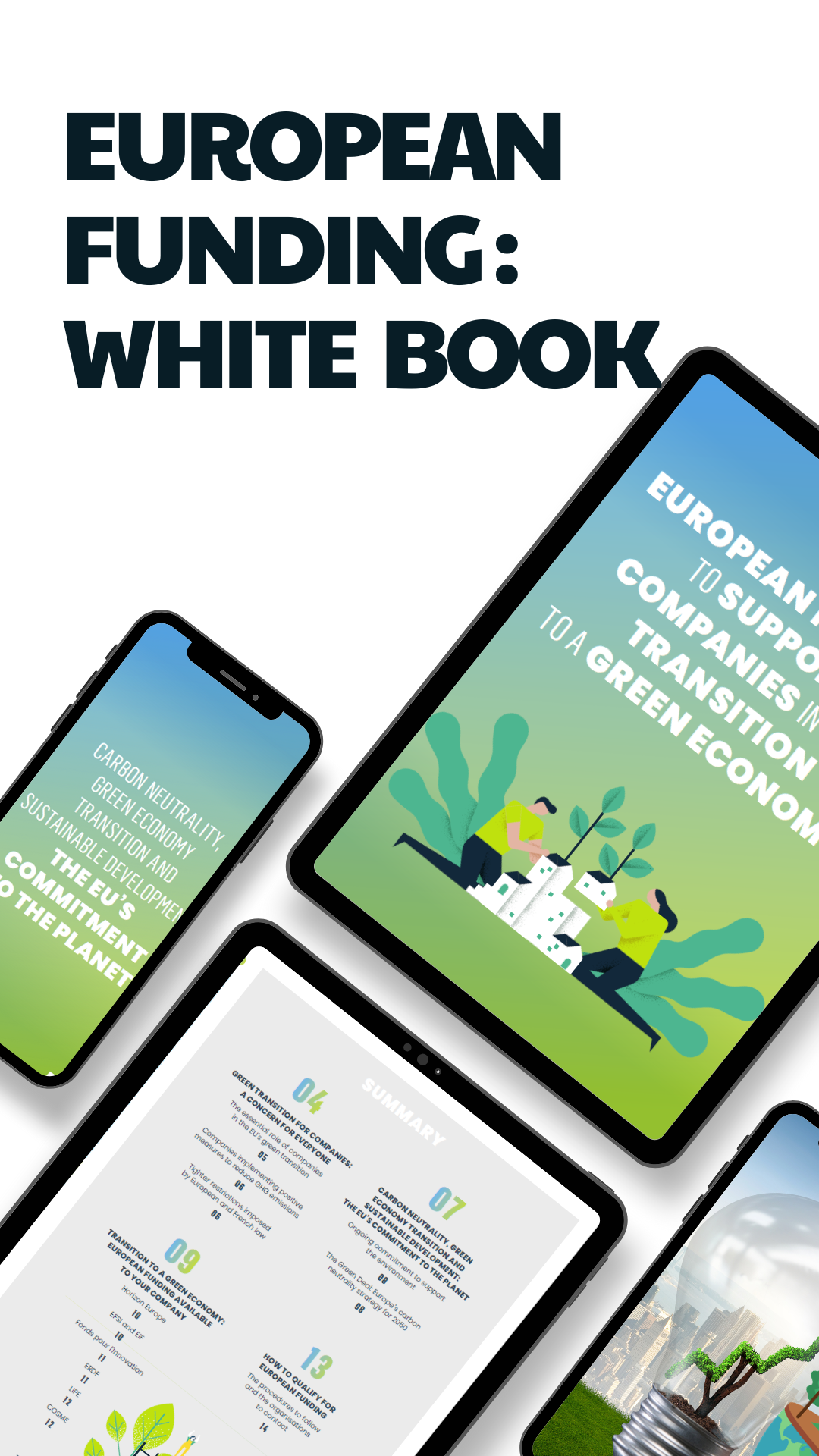Studies and analyses of employment in the green economy industries are increasingly presented in a specific context, focusing on particular markets. The benefit here is that a much more qualified overview is provided of something that previously had been just numbers and statistics. Conversely, outcomes may differ as a result of the viewpoints adopted by these studies, or simply because terms are defined differently between institutions.
In OECD countries, 20% of the workforce are in a role driven by the green transition
The 2024 edition of the OECD’s Employment Outlook suggests that within the OECD area (662 million jobs in May 2024)(1), almost 20% of those in work are in a role driven by the green transition, that is, “a job that contributes directly to reducing emissions” or “a job that produces intermediate goods and services in support of sustainable ecological activities.”
In France, eco-activities account for 2.7% of total employment
According to the French Statistical Data and Studies Department (Service des données et études statistiques – SDES)(2) , in 2021 eco-activities accounted for 745,000 full-time equivalent (FTE) roles in France, this representing on average 2.4% of added value of all economic activities and 2.7% of total employment nationwide. Of these 745,000 jobs, 366,300 relate to environmental protection, 285,900 concern resource management and 92,800 are in cross-cutting activities (general administration, R&D, engineering).
Overall, almost three-quarters (72%) of jobs in eco-activities fall into five sectors: organic agriculture (140,000 FTE), energy management (126,900 FTE), renewable energy production (109,800 FTE), waste management (102,000) and wastewater treatment (57,000 FTE).
While employment in eco-activities comprised 2.7% of total employment in 2021, this average masks significant variation sector by sector. So for example, eco-activities accounted for 26% of jobs in energy production (operation and maintenance of renewable energy systems). This compares with 20% in agriculture (organic farming, forestry) and 9.5% in construction (energy renovation of housing, construction of equipment to treat wastewater or other waste). However, the role of eco-activities was much more constrained in the manufacturing industry (2.3%) with some sectors growing (electric vehicles, wood-burning stoves, bio-fuels, heat pumps) and others in decline (vehicle exhaust systems, bin liners etc.). Eco-activities also had a limited presence in the service sector, with 2% of the total (administrative and support, scientific and technical, public administration and educational services) although SDES emphasises the potential for development in architecture, engineering and R&D sectors.
In 2021, there were almost 426,000 FTE in energy transition alone
Since 2008, ADEME has been monitoring some 30 industries across the three main sectors contributing to the energy transition: renewable energies and energy recovery, low energy low-emission land transport, and residential buildings. For each sector, the study followed the markets and their directly associated jobs.
The 2023 edition of this study indicated that these three sectors represented a turnover of €102.9 Bn with almost 426,000 FTE(3) in 2021. The top market was that of low energy low-emission land transport (mainly very low emission private vehicles), with turnover at €45.1 Bn (44% of the total of all three). This is home to almost one in three jobs in the three key energy transition sectors, with 131,270 FTE.
The second market was that of renewable energies and energy recovery, at €38.6 Bn, including renewable energy in building renovation. Renewable energies and energy recovery (the individual aerothermal heat pumps and thermodynamic water heaters installed in new builds, solar PV and hydroelectricity etc.) account for 82,500 FTE. A further 61,640 come from renewable energy in renovation renewable energy in renovation (wood burning heating equipments, individual aero- and geo-thermal heat pumps, CET and thermal solar panels installed during renovation).
The third market in 2021 was residential buildings (excluding renewable energy in building renovation) with turnover of €19.2 Bn (wall insulation, opener replacement). This sector accounted for 150,690 FTE, making it the largest jobs pool in the key three energy transition sectors.
Taken together, the sectors contributing to the energy transition have seen an average increase in their workforce of more than 9,000 FTE over the period 2010 – 2020. 2021 was marked by a significant spike in this employment, reaching almost 426,000 FTE. More up-to-date numbers will be published this autumn.
What about supply and demand for green economy jobs in 2023?
Another SDES study published this summer shows that over the whole of 2023, 14% of job applications and 16% of job offers posted by employers on the France Travail employment portal were related to “green jobs” (where the aim and/or skills applied contribute to the measurement, prevention, management and correction of negative impacts and damage to the environment) or “greening jobs” (the aim of which is not environmental, but which incorporate the new “skills bricks” (a French initiative to better handle professional training for environmental careers), to properly and quantifiably account for the environmental dimension in career management).
Accordingly, last year, of the 14% of jobseekers (some 761,600) looking for a green economy-related career, 34% were in building (of whom 65% in construction-renovation), 28% in transport, 12% in maintenance and protection of green natural spaces, 11% in the tourism-activity sector, 8% in industry, design, maintenance and HSE, 3% in water, sanitation, waste and air, 1% in purchasing, 1% in knowledge and research, and 1% in agriculture-forestry.
On the job opportunities side, employers posted 30,610 job offers on France Travail for “green jobs” and 627,560 for “greening jobs” – that’s 658,170 in total for 2023. More than two-thirds of those offers (67%) were in building (46%, so almost every other offer) and transport (21%) with jobs especially in the construction-renovation and driving sectors. 14.5% of offers concerned careers in industry, including in particular greening jobs in vehicle mechanics (eg electrification, diagnostics, and technical checks of vehicle environmental performance). Additionally, 7% of offers related to the tourism-activity sector; 5% in the maintenance and protection of spaces; 3% in water, sanitation, waste and air; 1.4% in purchasing and 0.5% in knowledge and research.
Executive employment offers in green jobs 2019 – 2023
APEC has published the 2024 edition of its dedicated barometer*. The document recalls that the French National Institute of Statistics and Economic Studies (Insee) estimated the number of private-sector executives working in the green economy in 2021 to be 870,620 with 28,850 of them in “green jobs” and 841,770 in “greening jobs”
Between 2019 and 2023, executive job offers for green jobs increased by 56%, actually representing 2.2% of executive job offers published in France in 2023, as against 1.5% in 2019. In 2023, almost 8 in 10 offers (75%) concerned the services sector (42% in engineering – R&D, and 9% in business consultancy); 16% concerned industry; 7% construction and 2% trade. More than 4 in every 10 offers were for Paris Region and Auvergne-Rhône Alpes.
Also according to the APEC barometer, private sector companies invested almost €24.5 Bn in sustainable development in 2023, seven times more than in 2019 (particularly in renewable energy, batteries and electric vehicles, waste treatment and recycling, sustainable buildings and eco-materials, agritech and biotech). These investments have generated over 17,000 executive and non-executive salaried jobs, of which almost half (47%) are in renewable energy, 29% in batteries and electric vehicles, 14% in waste and recycling, 8% in various and mixed roles, 2% in sustainable buildings and eco-materials, and 1% in agritech and biotech.
*Baromètre Transition écologique et emploi cadre – Edition 2024 – APEC (Association pour l’emploi des cadres) (The Barometer for the ecological transition and executive employment – 2024 edition – APEC (Association for Jobs in Management)
1) The Organisation for Economic Co-operation and Development (OECD) has 38 member countries worldwide. This study, published 9 July 2024, is based on the 35 countries for which data was available.
2) “Les éco-activités et l’emploi environnemental en 2021” (Eco-activities and environmental jobs in 2021), SDES, 8 July 2024.
3) “Marchés et emplois concourant à la transition énergétique”, Ademe, Octobre 2023 (“Markets and jobs contributing to the energy transition”, Ademe, October 2023)
Learn more : Updating the training and job skills required for the ecological transition




